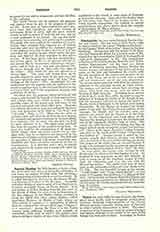

Passion Sunday, the fifth Sunday of Lent, a Sunday of the first class, not permitting the celebration of any feast, no matter of what rank, but allowing a commemoration of feasts which are not transferred. It is called Dominica de Passione in the Roman Missal, and Dominica Passionis in the Breviary. Durandus and other liturgical writers speak of it as Dominica in Passione, or simply Passio, or Passio Domini. It is also known as Judica Sunday, from the first word of the Introit of Mass; Isti sunt, from the beginning of the first response in the Matins; Octava median, it being the eighth day after Loetare Sunday, called sometimes Mediana, or Middle of Lent; Repus, an abbreviation of repositus, i.e. absconditus, or hidden from the veiling of the Crosses (Du Cange, “Glossar.” s.v. repositus). Among the Slays it is the Nedéla strastna (pain, suffering, terrible), muki (painful, or sorrowful), gluha (deaf or silent), tiha (quiet), smertelna (relating to death), or also tern’ (black), which appellation is also found in some parts of Germany as Schwartzer Sonntag. Since after this Sunday there are not many more days of the Lenten season the Greek Church admonishes the faithful to special mortifications, and places before them the example of the penitent St. Mary of Egypt.
FRANCIS MERSHMAN

